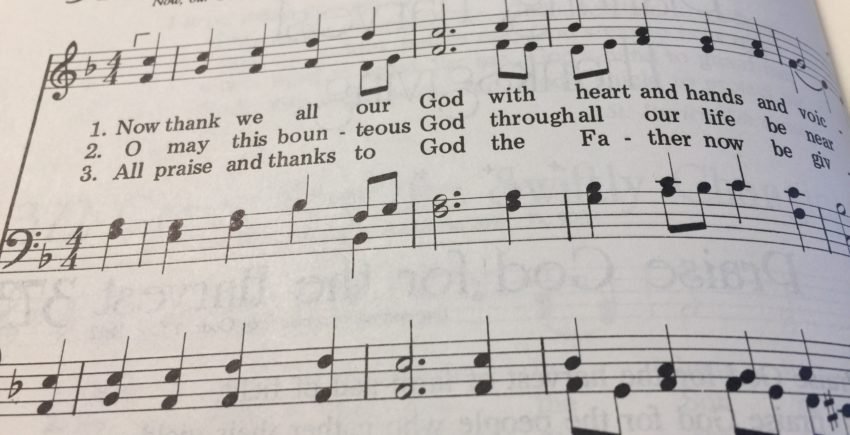
The Greatest Thanksgiving Hymn in History
Nothing helps us with our attitudes and emotions more than cultivating a habit of being thankful, continually, in all situations. A good hymn can help with that. I urge you to look up a video recording of “Now Thank We All Our God” and come to know it as well as any song you sing. Except for biblical passages like Psalm 100, it’s the greatest hymn of thanksgiving ever written–at least, in my opinion. The words say:
Now thank we all our God,
With hearts and hands and voices,
Who wondrous things has done,
In Whom this world rejoices;
Who from our mothers’ arms
Has blessed us on our way
With countless gifts of love,
And still is ours today.
The hymn has three verses, all of equal depth and delight, and its musical score is almost as old as the hymn. But our appreciation for “Now Thank We All Our God” increases when we realize it was likely written during the horrors of the Thirty Years’ War.
Martin Rinkart, a brilliant musician and theologian, became pastor in the Saxony town of Eilenburg just as the War was starting; and his ministry there ended just as the war was ending. His entire ministry, then, was spent against the backdrop of war, famine, depression, and plague. Listen to this old biographical sketch:
“Rinkart was the son of a poor coppersmith, who got his education at the University of Leipzig, after a hard struggle, in which he was successful by reason of his musical gifts and decided industry. At the age of 31 offered the position of archdeacon (pastor) at Eilenburg in Saxony, his native place. Thither he went as the war broke out, and there he remained through all the thirty-one years of its continuance. He shared with his people the hardships of the period; the quartering of troops in the houses; the distress of poverty, and the uncertainties of conflict. In 1637 the plague ravaged Eilenburg, and in one year 8,000 persons died. But Martin Rinkart stood to his duty, doing the work of three men, in ministering to the sick, waiting on them, and even burying them when they died. It is said that he actually interred with his own hands 4480 bodies. The famine following the plague was as terrible as the disease. Starving wretches fought in the open streets for a dead cat or a crow. And then, to crown all, back came the Swedish army and the town was ordered to pay 30,000 thalers. The general refused to hear Rinkart when he ventured to the camp to plead for his impoverished fellow-citizens, and the good man, turning to the others who were with him, said: ‘Come, my children, we can find no mercy with men, let us take refuge with God.’ He fell on his knees, and uttered such a fervent and touching petition that the general relented and lowered the demand….”[i]
Somewhere during these difficult years, Rinkart wrote this great anthem of thanksgiving to remind ourselves that even in the worst of times we have the highest of blessings, if we will but see and receive them. His hymn, “Now Thank We All Our God,” has been called the German Te Deum.
O may this bounteous God
Through all our life be near us,
With ever joyful hearts
And blessed peace to cheer us,
And keep us in his grace,
And guide us when perplexed,
And free us from all ills
Of this world and the next.
Amen and amen!
PS – Check out other stories of the great hymns in my series of book, Then Sings My Soul.
[i] Samuel Willoughby Duffield, English Hymns: Their Authors and History (New York and London: Funk & Wagnalls Company, 1886), 393.